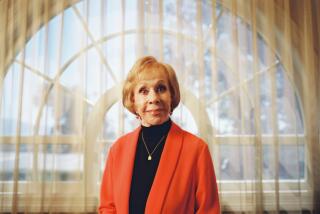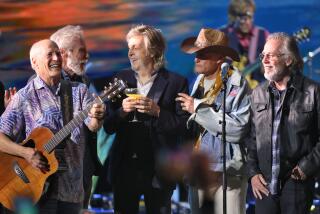T-Bone Stakes Out Radio Variety Show : Pop music: Burnett’s Friday-night concerts at McCabe’s will become an NPR Christmas special. He wants them to be ‘like Ed Sullivan meets the Grand Ole Opry.’
- Share via
“It’s mostly music,” says T-Bone Burnett of his current series of holiday-themed live variety shows, “but also comedy, drama, poetry and satire. It’s a typical Christmas show with nude dancers.”
Indeed, the Friday night concerts being hosted all month long by the legendary singer-producer-raconteur have marked the first occasion on which an erotic dancer has ever appeared on the tiny stage in the concert room at McCabe’s Guitar Shop in Santa Monica, in time of seasonal glee or otherwise. Other special guests have been on the tamer, more traditional side, but little has been typical about any of these shows, which are being recorded for a Christmas Eve special on National Public Radio.
Though stars and cult figures of renown have been sitting in on the concerts in the 150-seat room, these aren’t your usual McCabe’s low-key folkie acoustic gigs. “When we’re doing these shows,” said Burnett, “we’re trying to do them as a real variety show--like a combination of the Ed Sullivan show and the Grand Ole Opry--instead of rounding up the usual suspects and running them out on stage to do ‘Michael Row the Boat Ashore’ or something.”
Surprise musical guests over the last three Fridays have included Sam Phillips (Burnett’s recording artist wife), Van Dyke Parks, Joe Henry, Booker T. Jones, classical/jazz/bluegrass musicians Edgar Meyer and Jerry Douglas, and even actor Jeff Bridges, accompanying himself on guitar. For the capping show this weekend, two well-known country and folk singers are expected.
Last Friday, the happy incongruities built upon one another: veteran satirists Stan Freberg and Harry Shearer taking aim at Japanese ownership of movie studios, followed by Victoria Williams singing a lilting “O Holy Night,” succeeded by “Big Bottom” and other acoustic heavy-metal favorites in a lengthy set from the reunited Spinal Tap.
And Burnett wasn’t just joshing about the promised opening-night appearance by the Zen Nude Dancers--who turned out to be merely one dancer with some clothes on gyrating to a surf-guitar instrumental, albeit one professionally risque enough to embarrass some in the genteel folk club.
Since the show was not only being recorded on audiotape for NPR but also being filmed by documentarian D. A. Pennebaker (“Don’t Look Back”), Burnett provided the entire audience with brown paper bags to slip over their heads, “in case you plan to run for office someday.” But the bags came custom-altered with eye-level slits, so attendees could conceivably enjoy the eroticism and someday join the Supreme Court.
The radio special and concerts jibed when McCabe’s concert coordinator John Chelew got a call from NPR’s Margaret Howze wondering if any of his November bookings would be appropriate for taping a Christmas special, a query that came just as Chelew was nailing down Burnett to a long-promised multiple-night stand.
The completed radio show will be made available to NPR affiliates in the form of two one-hour specials, to be broadcast separately or together Dec. 24 and/or Dec. 25.
After two years of not playing live and five of not touring, in favor of producing albums for artists ranging from Elvis Costello to Bruce Cockburn, Burnett is excited about taking the stage again, about his new Columbia album (due next year), and especially about working in the realm of radio. If this Christmas special goes over well, he might work with Chelew on trying to put together a weekly or monthly show for NPR that could likewise be taped at McCabe’s, a variety hour that might land somewhere between an urbanized “Mountain Stage” and an edgy “Prairie Home Companion.”
“I think one thing we need to do in this day and age is look for alternative ways of getting things out,” Burnett said. “As the corporate media become more and more narrow and owned by fewer and fewer people, we need to look for alternative places to have stuff viewed and heard and projected, and NPR or any avenue that can operate outside of the strictures of commercial necessity becomes more and more important.
“It’s gotten to the point that there’s actually some fairly enjoyable things on television now, even on MTV, but there are just too many pictures everywhere--in the movies, in the newspaper, on Sunset Boulevard. . . .
“So I think radio becomes more and more interesting,” Burnett said. “It’s more like 100 years ago--or 100 years from now.”
More to Read
The biggest entertainment stories
Get our big stories about Hollywood, film, television, music, arts, culture and more right in your inbox as soon as they publish.
You may occasionally receive promotional content from the Los Angeles Times.










